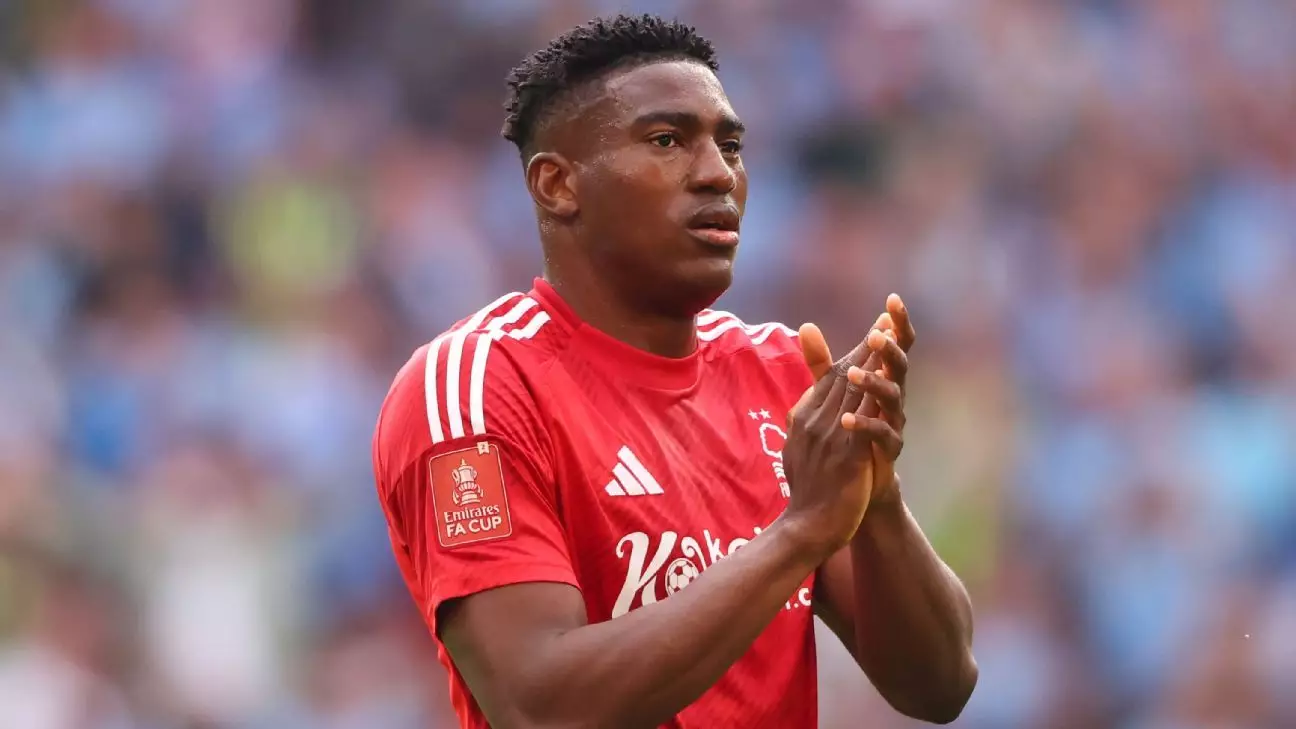As the tension built in the closing moments of the recent Nottingham Forest match against Leicester City, few could have anticipated the traumatic turn of events that would unfold. Taiwo Awoniyi, Forest’s promising Nigerian striker, found himself at the center of a horrifying incident when a collision with the goalpost led to a severe abdominal injury. This incident, which happened shortly after he was substituted into the game, forced the team into disarray and ignited heated discussions about player safety, medical responses, and managerial accountability.
Awoniyi’s injury is a painful reminder of the physical risks inherent in sports, raising critical questions about protocols surrounding player health and recovery. His emergency surgery, necessitated by the serious nature of the injury, has placed him in an induced coma — a medical procedure aimed at both stabilizing his condition and fostering recovery. This brings an air of gravity to the situation that extends beyond typical matchday drama, underlining the life-or-death stakes that athletes face on the field.
The Managers and Medical Staff: A Tense Miscommunication
The aftermath of Awoniyi’s injury was marked by turmoil on the sidelines. Notably, Forest owner Evangelos Marinakis confronted manager Nuno Espirito Santo in a dramatic display of frustration that spoke volumes about the chaos that can ensue in high-pressure scenarios. Espirito Santo has publicly stated that Marinakis was reacting to what he perceived as a critical miscommunication between the coaching staff and the medical team post-injury, leaving fans and sports analysts alike speculating about accountability and decision-making under pressure.
The fact that Awoniyi signaled his readiness to continue playing raises another layer of complexity. This incident illustrates a crucial dilemma in football: players often feel compelled to play through pain, sometimes at the cost of their health. In the aftermath, it appears that despite the player’s indications, he was far from fit to participate, resulting in Nottingham Forest effectively playing a man down during the final minutes of the match. This decision had dire implications, not just for the match outcome but also for Awoniyi’s well-being.
Fan Reactions and Institutional Responsibility
Fans and pundits have rallied around the narrative of player safety since the incident, highlighting a collective need for improvement in medical protocols across leagues. Social media buzzed with reactions ranging from outrage about the club’s handling of the situation to calls for systemic changes in how professional sports manage emergency care. This incident acts as a catalyst for discussions on the need for stricter regulations that prioritize athletes’ health, even amidst the fierce competitiveness of professional sports.
The recent statement from Nottingham Forest following Awoniyi’s surgery was a cautious reassurance that he was “recovering well.” However, the underlying anxiety remains palpable, both for fans and for Awoniyi’s teammates as they navigate a critical phase in their Premier League campaign, vying for a spot in the Champions League.
Leadership in Crisis: Marinakis’ Emotional Investment
The emotional turmoil displayed by Marinakis during the episode reveals a depth of commitment often unseen in the corporate veneer of club ownership. His response to Awoniyi’s distress signals a human connection that transcends numbers, investments, and statistics. As the owner of a football club, Marinakis embodies a rarer breed of leadership—one that acknowledges the intricate web of human lives caught in the whirlwind of professional sports.
His approach should inspire a rethink of how club leaders engage in emergencies—perhaps highlighting a need for more transparency, genuine care, and an emphasis on welfare in the executive decision-making processes. The sport demands that leaders not only foster an environment of competition but also champion the health and safety of their players, recognizing that the well-being of young athletes often lies precariously in the balance.
Through this ordeal, Awoniyi’s situation underscores the fragility of athletic careers and calls for a concerted effort to refine medical protocols and enhance communication within teams. As Nottingham Forest continues its push for Champions League qualification, the specter of Awoniyi’s injury looms large, presenting a pressing need for reform in football that places the health of players above the complexities of sport’s competitive narrative.

